Autonomous Delivery Research: Foundation Models Promote the Normal Application of Autonomous Delivery in Multiple Scenarios
Autonomous Delivery Industry Research Report, 2024 released by ResearchInChina combs and studies the status quo of autonomous delivery vehicles in the autonomous delivery industry, the application scenarios of autonomous delivery robots and solution providers, as well as predicts the future development trends of autonomous delivery.
?
1. Autonomous delivery vehicles have entered normal operation, and Jiangsu Province is at the forefront of the country.
?
So far, autonomous delivery has been applied to express delivery, supermarkets, autonomous retail and other scenarios. The normal application of autonomous delivery has been realized in express delivery enterprises. By region, the normal operation of autonomous delivery vehicles in express delivery enterprises was mainly concentrated in East China, North China and Northwest China during the period from early 2023 to May 2024. Specifically: East China saw the most autonomous delivery vehicles, which mainly spread in Jiangsu, Anhui and Zhejiang. By province, the ranking is Jiangsu > Anhui > Shaanxi > Zhejiang > Shanxi > Sichuan > Hebei/Beijing.?
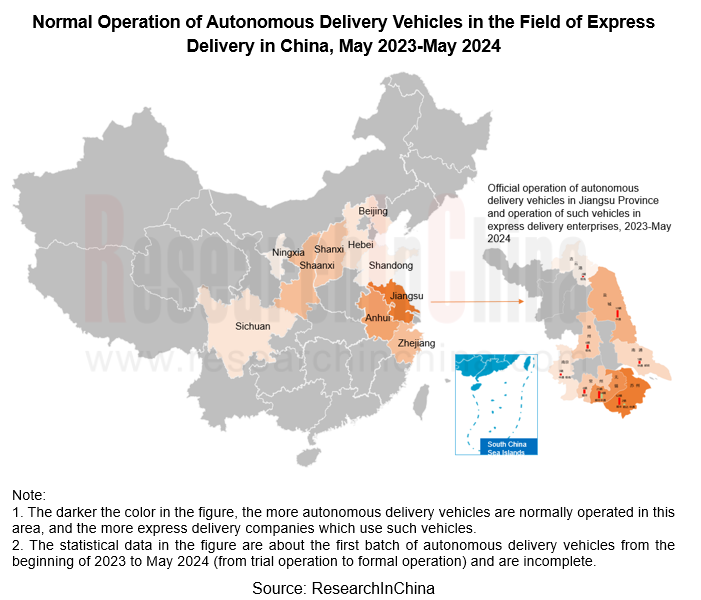
Jiangsu Province has the largest number of autonomous delivery vehicles in normal operation, and Suzhou is the city with the most autonomous delivery vehicles in express delivery enterprises in Jiangsu and even the whole country. In November 2023, Jiangsu took the lead in the country to enact legislation to promote the development of Internet of Vehicles and intelligent connected vehicles: the Standing Committee of the 14th Jiangsu Provincial People's Congress approved the "Decision on Promoting the Development of Internet of Vehicles and Intelligent Connected Vehicles", which made guiding and authoritative provisions on the passage and management of autonomous driving equipment such as autonomous delivery vehicles on roads and came into effect on January 1, 2024. By April 2024, there had been 41 autonomous delivery vehicles in normal operation in Xiangcheng District of Suzhou, delivering about 14,000 parcels every day. Xiangcheng District reached in-depth cooperation with express delivery companies such as SF Express, Yunda Express and STO Express.
The following indicates the normal operation of autonomous delivery vehicles in express delivery enterprises by province:
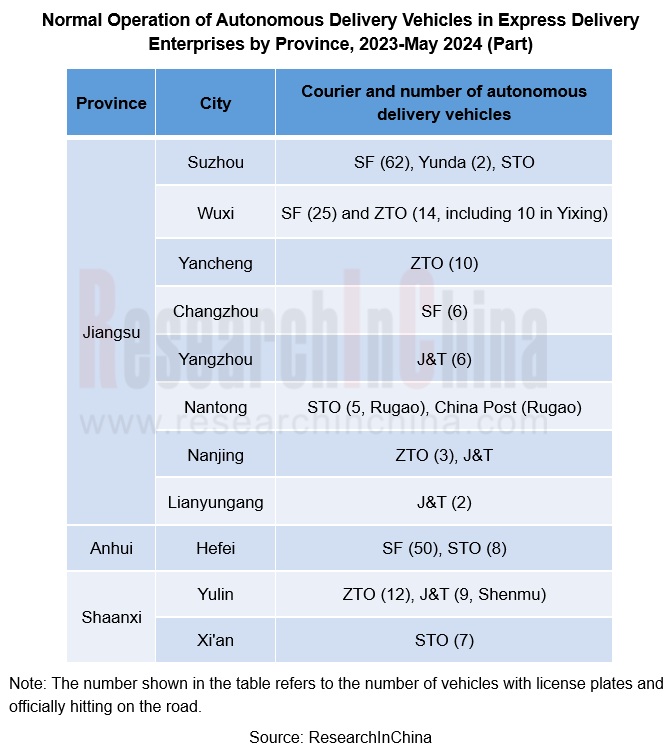
?2. "Outdoor autonomous vehicles + indoor robots" can accomplish autonomous direct delivery to destinations.
?
In June 2023, an "outdoor autonomous vehicles + indoor robots" integrated AI delivery solution was officially launched in the headquarters of China Postal Express & Logistics. The new solution can combine outdoor autonomous vehicles with different indoor robots to directly deliver goods to destinations in a variety of scenarios. For example, outdoor autonomous vehicles contact indoor robots, mailroom staff operate robots to deliver goods to destinations, users can order coffee via WeChat applets which is then delivered by robots, and robots pick up items after users place orders on the WeChat applet of EMS.
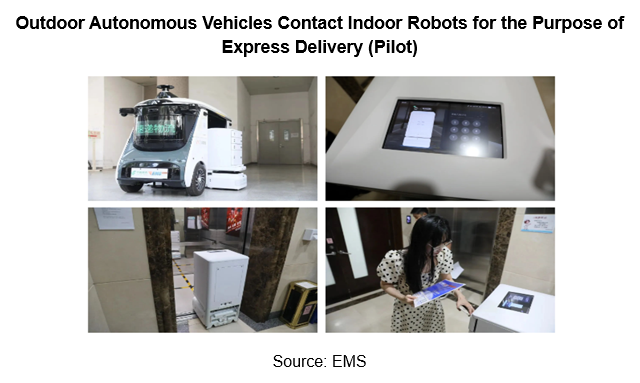
The "outdoor autonomous vehicles + indoor robots" delivery solution mainly relies on the super chassis and super brains of outdoor autonomous vehicles to contact different indoor robots for intensive sharing, wide cooperation and real-time scheduling, while indoor robots have complete perception and cognitive functional components as well as mature positioning and navigation functional components to summon elevators with one key, open electronic doors, pass turnstiles and access Internet of Things.
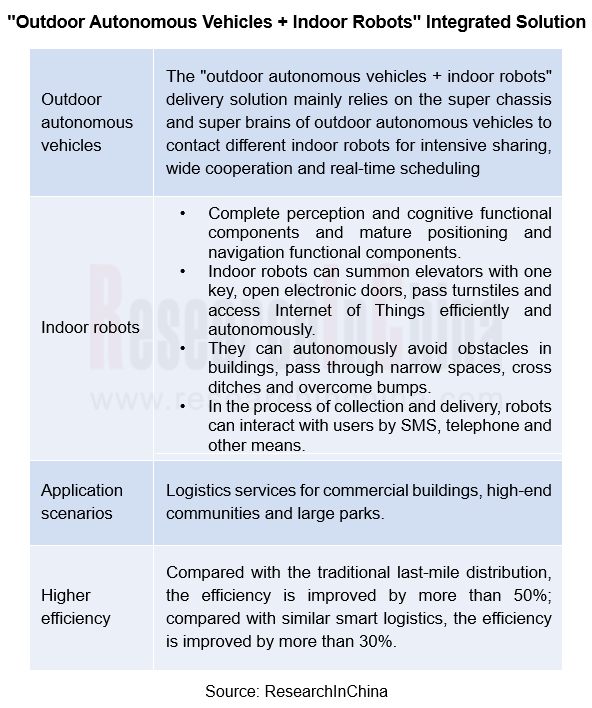
In April 2024, the WeChat applet of EMS launched the robot door-to-door delivery service. On the delivery page of the applet, there is an additional "robot door-to-door" delivery option. In large parks, universities and other places, couriers operate autonomous vehicles to transport parcels downstairs, and them indoor robots automatically "relay" them to destinations.
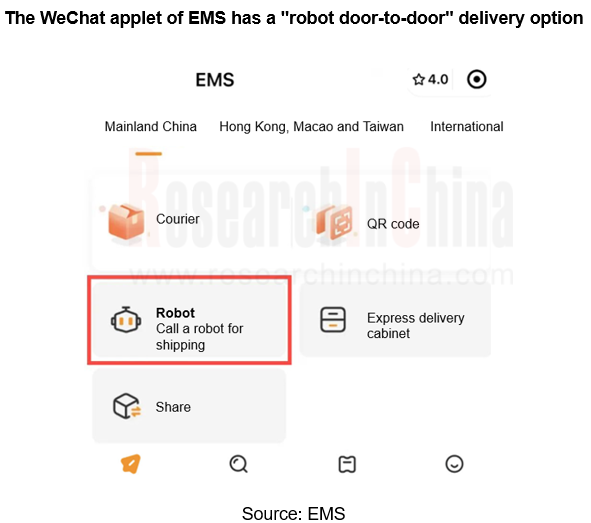
3. Autonomous delivery technology has been rapidly iterated, and BEV+Transformer perception technology has landed on vehicles.
?
The algorithm structure of NEOLIX has gone through three stages, from first stage of light perception and heavy maps, to the second stage of heavy perception and light maps, and to the third stage of real-time map generation based on 4D perception of foundation models.
On the technical level of autonomous driving software, X3 Plus, Neolix’s? autonomous vehicle, strictly follows the underlying technical architecture logic of autonomous driving, adopts the multi-modal BEV space 4D time sequence fusion perception technology, carries Orion-X to realize pre-fusion BEV perception, and leverages the Transformer perception foundation model to process multi-sensor data of continuous time series in real time and realize zero-blind-spot, high-precision and high-robustness environmental perception.
In BEV space, time sequence fusion is carried out to form 4D space. At the same time, complex traffic flow reinforcement learning (TFRL) allows autonomous vehicles to interact with other road participants and predict their future behavior, so as to conduct better planning and control. Neolix’s autonomous driving system has the capability of autonomous learning, so that it can perceive more complex obstacles, handle more complicated roads, and make autonomous delivery easy.
In other words, all the features of 2 lidars and 11 panoramic cameras are converted into the BEV space for fusion, and more comprehensive perception is fulfilled based on the fused features. This system can make full use of the advantages of each sensor, and overcome the corresponding shortcomings, so as to perform perfect perception within a range of 40m front and rear and 30m left and right, and ensure that autonomous vehicles can accurately detect objects and lane lines and recognize traffic lights, thus guaranteeing the driving safety of autonomous vehicles.
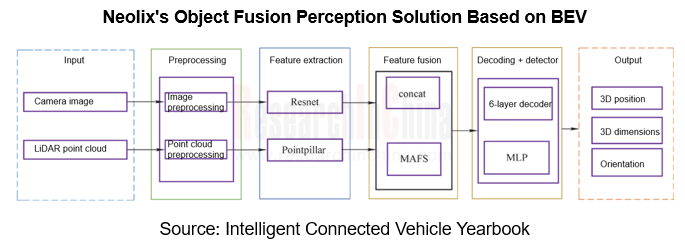
Autonomous Driving Domain Controller and Central Computing Unit (CCU) Industry Report, 2025
Research on Autonomous Driving Domain Controllers: Monthly Penetration Rate Exceeded 30% for the First Time, and 700T+ Ultrahigh-compute Domain Controller Products Are Rapidly Installed in Vehicles
L...
China Automotive Lighting and Ambient Lighting System Research Report, 2025
Automotive Lighting System Research: In 2025H1, Autonomous Driving System (ADS) Marker Lamps Saw an 11-Fold Year-on-Year Growth and the Installation Rate of Automotive LED Lighting Approached 90...
Ecological Domain and Automotive Hardware Expansion Research Report, 2025
ResearchInChina has released the Ecological Domain and Automotive Hardware Expansion Research Report, 2025, which delves into the application of various automotive extended hardware, supplier ecologic...
Automotive Seating Innovation Technology Trend Research Report, 2025
Automotive Seating Research: With Popularization of Comfort Functions, How to Properly "Stack Functions" for Seating?
This report studies the status quo of seating technologies and functions in aspe...
Research Report on Chinese Suppliers’ Overseas Layout of Intelligent Driving, 2025
Research on Overseas Layout of Intelligent Driving: There Are Multiple Challenges in Overseas Layout, and Light-Asset Cooperation with Foreign Suppliers Emerges as the Optimal Solution at Present
20...
High-Voltage Power Supply in New Energy Vehicle (BMS, BDU, Relay, Integrated Battery Box) Research Report, 2025
The high-voltage power supply system is a core component of new energy vehicles. The battery pack serves as the central energy source, with the capacity of power battery affecting the vehicle's range,...
Automotive Radio Frequency System-on-Chip (RF SoC) and Module Research Report, 2025
Automotive RF SoC Research: The Pace of Introducing "Nerve Endings" such as UWB, NTN Satellite Communication, NearLink, and WIFI into Intelligent Vehicles Quickens
RF SoC (Radio Frequency Syst...
Automotive Power Management ICs and Signal Chain Chips Industry Research Report, 2025
Analog chips are used to process continuous analog signals from the natural world, such as light, sound, electricity/magnetism, position/speed/acceleration, and temperature. They are mainly composed o...
Global and China Electronic Rearview Mirror Industry Report, 2025
Based on the installation location, electronic rearview mirrors can be divided into electronic interior rearview mirrors (i.e., streaming media rearview mirrors) and electronic exterior rearview mirro...
Intelligent Cockpit Tier 1 Supplier Research Report, 2025 (Chinese Companies)
Intelligent Cockpit Tier1 Suppliers Research: Emerging AI Cockpit Products Fuel Layout of Full-Scenario Cockpit Ecosystem
This report mainly analyzes the current layout, innovative products, and deve...
Next-generation Central and Zonal Communication Network Topology and Chip Industry Research Report, 2025
The automotive E/E architecture is evolving towards a "central computing + zonal control" architecture, where the central computing platform is responsible for high-computing-power tasks, and zonal co...
Vehicle-road-cloud Integration and C-V2X Industry Research Report, 2025
Vehicle-side C-V2X Application Scenarios: Transition from R16 to R17, Providing a Communication Base for High-level Autonomous Driving, with the C-V2X On-board Explosion Period Approaching
In 2024, t...
Intelligent Cockpit Patent Analysis Report, 2025
Patent Trend: Three Major Directions of Intelligent Cockpits in 2025
This report explores the development trends of cutting-edge intelligent cockpits from the perspective of patents. The research sco...
Smart Car Information Security (Cybersecurity and Data Security) Research Report, 2025
Research on Automotive Information Security: AI Fusion Intelligent Protection and Ecological Collaboration Ensure Cybersecurity and Data Security
At present, what are the security risks faced by inte...
New Energy Vehicle 800-1000V High-Voltage Architecture and Supply Chain Research Report, 2025
Research on 800-1000V Architecture: to be installed in over 7 million vehicles in 2030, marking the arrival of the era of full-domain high voltage and megawatt supercharging.
In 2025, the 800-1000V h...
Foreign Tier 1 ADAS Suppliers Industry Research Report 2025
Research on Overseas Tier 1 ADAS Suppliers: Three Paths for Foreign Enterprises to Transfer to NOA
Foreign Tier 1 ADAS suppliers are obviously lagging behind in the field of NOA.
In 2024, Aptiv (2.6...
VLA Large Model Applications in Automotive and Robotics Research Report, 2025
ResearchInChina releases "VLA Large Model Applications in Automotive and Robotics Research Report, 2025": The report summarizes and analyzes the technical origin, development stages, application cases...
OEMs’ Next-generation In-vehicle Infotainment (IVI) System Trends Report, 2025
ResearchInChina releases the "OEMs’ Next-generation In-vehicle Infotainment (IVI) System Trends Report, 2025", which sorts out iterative development context of mainstream automakers in terms of infota...